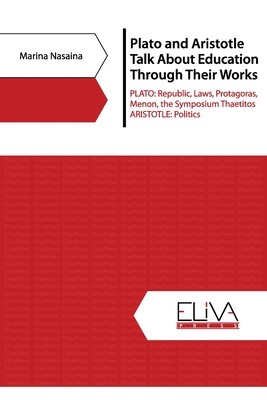
- We will send in 10–14 business days.
- Author: Marina Nasaina
- Publisher: Eliva Press
- ISBN-10: 1952751489
- ISBN-13: 9781952751486
- Format: 15.2 x 22.9 x 0.3 cm, softcover
- Language: English
- SAVE -10% with code: EXTRA
Plato and Aristotle Talk about Education Through Their Works (e-book) (used book) | bookbook.eu
Reviews
Description
Plato, through the dialogues of Republic, Laws, Protagoras, Menon, The Symposium and Theetitos, links inherently education with state stability. The proper functioning of the state machinery presupposes education and seeks the first foundation of political and social stability. The role of education at the social and political level is enormous, since it believes that the political instability of its time, the corruption of institutions and morals should be addressed through a political and social reform, based in particular on a rigorous control in the field of education. Aristotle, on the other hand, in his Politics connects the state, which has the greatest responsibility for the proper education of the citizens, with education. The main purpose of education for Aristotle is to create people with quality character. Virtue is not for the philosopher a personal success of man but is the result of a group effort of socialization that is conquered within organized society and is inextricably linked to political society. After all, education must teach young people the necessary knowledge for their daily lives and everything that is necessary to make a person more moral. Thus, the ultimate goal of education is the formation of a quality character along with the parallel and equal practice of moral and mental virtue, which will lead society collectively to happiness.
EXTRA 10 % discount with code: EXTRA
The promotion ends in 19d.10:02:29
The discount code is valid when purchasing from 10 €. Discounts do not stack.
- Author: Marina Nasaina
- Publisher: Eliva Press
- ISBN-10: 1952751489
- ISBN-13: 9781952751486
- Format: 15.2 x 22.9 x 0.3 cm, softcover
- Language: English English
Plato, through the dialogues of Republic, Laws, Protagoras, Menon, The Symposium and Theetitos, links inherently education with state stability. The proper functioning of the state machinery presupposes education and seeks the first foundation of political and social stability. The role of education at the social and political level is enormous, since it believes that the political instability of its time, the corruption of institutions and morals should be addressed through a political and social reform, based in particular on a rigorous control in the field of education. Aristotle, on the other hand, in his Politics connects the state, which has the greatest responsibility for the proper education of the citizens, with education. The main purpose of education for Aristotle is to create people with quality character. Virtue is not for the philosopher a personal success of man but is the result of a group effort of socialization that is conquered within organized society and is inextricably linked to political society. After all, education must teach young people the necessary knowledge for their daily lives and everything that is necessary to make a person more moral. Thus, the ultimate goal of education is the formation of a quality character along with the parallel and equal practice of moral and mental virtue, which will lead society collectively to happiness.


Reviews